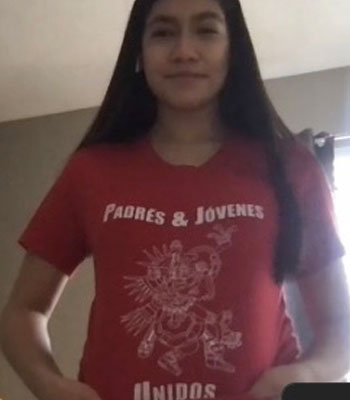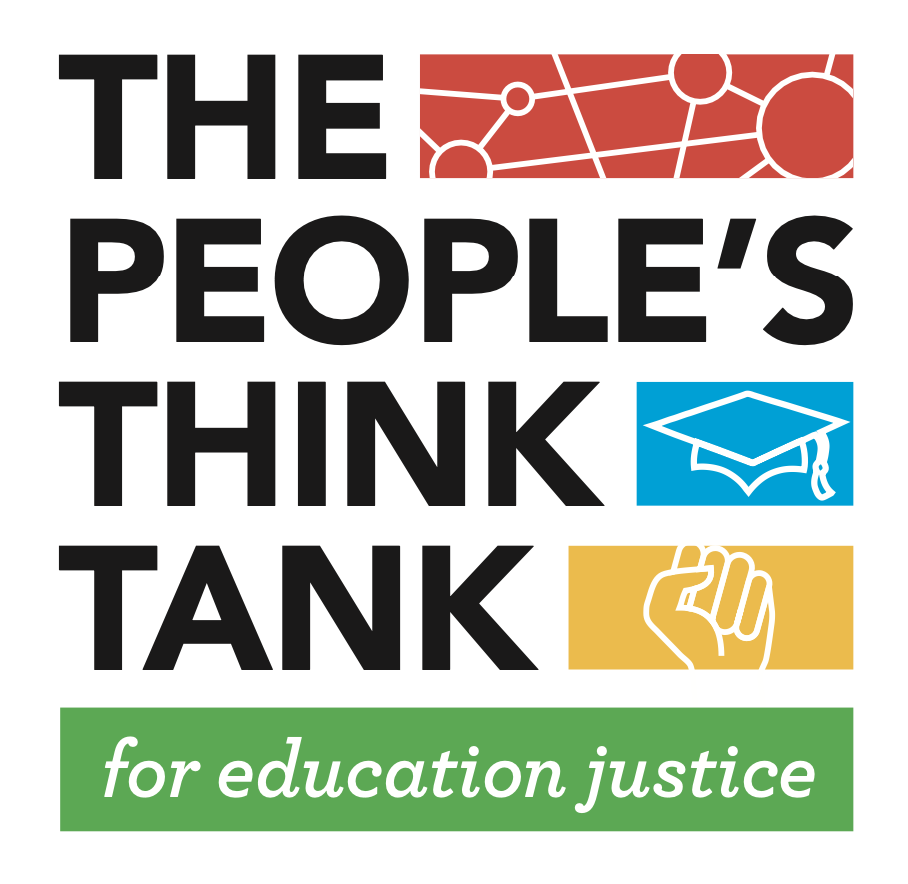< back to The Newest Abolitionists

By Madison Ordonez
Padres & Jóvenes Unidos, Denver
With the assistance of Diane Beckman and Sara Niño
University of Massachusetts Boston
Madison Ordonez is a young college student who has already found her path. At just 18 she tells her story of an incident that changed her life, bringing her closer to understanding her own identity and her desire to advocate for others who have a similar background as herself. Since that moment, she has been involved in numerous equity initiatives and organizations leading her to current membership in Padres & Jóvenes Unidos (PJU) and the fight against the school-to-prison and school-to-deportation pipelines. When Madison found inequity in her high school she began educating, both herself and others. Wearing a shirt with the PJU logo on it, Madison feels a connection between the image of the Aztec deity Quetzalcoatl representing knowledge and learning with her work educating herself and others, building bridges, and contributing to change.
I’ve been wearing this shirt for a while now. I’ve worn it throughout most of the work that we’ve done and all of the movements. It represents the origins of indigenous Mexican culture. It also represents our connection back to our roots. I find significance in it because the shirt reminds me of the work that I’ve done, and why. I want to represent and be an advocate for my rights and the rights of others with similar backgrounds to mine.
I would say I identify as a Latina, and my pronouns are she, her, and hers. The term Latinx can also be used, which is more gender-inclusive. The “x” at the end of the word is an American term that doesn’t exist in the Spanish language. I don’t mind the use of either, although I prefer the term Latina because it represents me most as being a Latin woman of color. Being first-generation, I went through a process of assimilating into American culture.
My first experience with the police happened when I was in my community, outside of school. A couple of friends and I were in a predominantly white shopping center when a white woman aggressively approached us. At the time, we were laughing at an inside personal joke and she thought our laughter was directed towards her. She became really defensive and started interrogating us. That was when one of my friends stepped in and began speaking with the woman. Things started to escalate, and she became verbally aggressive to us and then physically aggressive with my friend. During this time, my friend didn’t do much in response, we were all just really frozen in shock. We decided to go to the mall police for help. The police decided to investigate it, but I don’t think their perspective of the investigation was the same as ours. When they spoke with the woman and her partner, it seemed like they just had a casual chat. They were giggling, while we were traumatized by the experience. As they left, the woman decided to mock and laugh at us while the officers just shoved their behavior under the rug. That is when I realized that racial injustice is a common theme in policing.
Educating Myself and Others
I began by learning more about racial injustice within the public school systems. I noticed my school had less opportunities for people of color. My high school was very diverse; you could look around and notice that there were students from all types of backgrounds. But in the classrooms is where the difference was obvious. In the advanced classes, there was less representation of students of color and of low socio-economic background. I saw that as an injustice.
That’s when I started organizing. I joined the Latino Students United Club, where I had the opportunity to engage with others that share similar experiences as mine. And from there, I became more aware of the culture shocks and the differences that other students like me face. I was inspired to look more into it because I felt frustrated by the fact that we struggle more than others. And we are sometimes disenfranchised.
I learned that my school system had police targeting students of color in disproportionate rates compared to our white peers. Students of color are punished with harsher punishments and there is less leniency or understanding for those students. This had a double impact for Latinx students. The schools have SROs (school resource officers), which can be a threat to undocumented students, not only because this can funnel them into the school-to-prison pipeline, but they can also be funneled into the school-to-deportation pipeline. The pipeline describes the path to deportation through forms of policing and punishment from the school system just as the school-to-prison pipeline describes a path to the criminal justice system. Where a white student might be punished by detention, or even a simple conversation with a school administrator, a student of color could be deported or accused of being a criminal for the same offence.
Advocating and Activism
I started reaching out to organizations and I was presented with the perfect opportunity. Before PJU, I joined a different organization that was based in school. It was called Student Voice and Leadership (SVL). I was able to work with other students, who are also students of color, in a branch of the organization called Young African American, Latinx Leaders. We worked directly with school board members, community members, parents, teachers, students, and any others that are impacted by the Denver Public School (DPS) system, to change policy that affects students of color.
I discovered PJU through a student who had been involved in the same organizations that I had been in the past, and she also came from a similar background as mine. She told me about Padres & Jóvenes Unidos and the work that they do. It really stuck out to me and inspired me to work with them because they focus, or we focus, on work with Latinx communities. We focus on issues that Latinx community members face more often, such as immigration, language barriers, and the particular movement that I was really moved by – the Education Not Incarceration (ENI) project. We address the school-to-prison pipeline and also the school-to-deportation pipeline. Most people are not aware of the deportation pipeline. I just want to be able to help others and so I acted upon it.
I believe there’s a kind of “group think” thing happening because people are realizing that there are injustices occurring and that there’s something wrong with the system overall. A lot of it has to do with policing and how people of different groups are treated. So, people are waking up and realizing that there needs to be a lot done; and those who haven’t been impacted, or those of privilege, have also realized that they need to take a more active role. In the past year, everyone who lives in America, at least most people, have realized this. We can give credit to the Black Lives Matter organization and movement, because they have really united members of all backgrounds and created momentum.
In the past 30 years, for instance, progress has been slow. Even working with the ENI campaign, parents and school board members have not always been as actively involved as students have because their definition, or perspective, of safety and policing has differed from ours. We have made a great effort through political education and storytelling to get those parents to be our allies, to support us, and be part of the work that we do. But this past year a lot of those school board members and parents have finally realized that policing in school is a problem. It made them unite with Padres & Jóvenes Unidos, and we were able to finally get them to pass a resolution that removed police and SROs from schools in DPS. This got us one step closer to protecting students of color by decreasing those that are being targeted by police. We redefined safety through the passing of that resolution.
Our focus now is to make sure that policies and resolutions that have passed are actually implemented, and that’s by holding the school board members and superintendent accountable. The last DPS school superintendent left, so that has been a bit of a setback. We are trying to engage with that by reaching out to a potential new superintendent, whose views align with ours, so that we can continue receiving support and working with them to make sure that what was passed gets implemented.
There is other work to be done also, on an individual level, for example, voter engagement work. I reach out to people and ask them if they have voted, or if they’re aware of what’s currently going on in the political climate, and how much information they have about it. Depending on the response of the person, I formulate something that could help them, maybe forward their engagement, because some community members may not be aware that they have certain rights. You always want to reach out and let them know that they do have those rights. There are others who are not aware of how they can use those rights, or the power that their rights hold. When you inform people of what is available, they can then make more informed decisions and have impact and be active members of their community.
Using My Voice
Reaching out to others, educating them, and advocating for them, as well as myself, has become important to me. I see that there is a lot of progress occurring, as more individuals are becoming educated and having conversations. But not everything is about having a conversation, because there needs to be direct action. I’ve been involved in many different areas of the work led by PJU, including direct actions and civic engagement, but it’s been in educating myself that caused my passion and involvement to grow. I hope that in the future, there is more direct action and that people hold others accountable, and that those being held accountable make sure that they are listening. It frustrates me that myself and others have to fight for basic human rights, but I want to continue to do this work and make an even greater impact.
When I first realized that my rights are not the same as others’ rights, I really began to feel frustrated. While I’ve always felt this frustration, I haven’t always acted upon it. Before, I would not actively use my voice. I was very passive. Now, I use my voice to educate myself and others.
